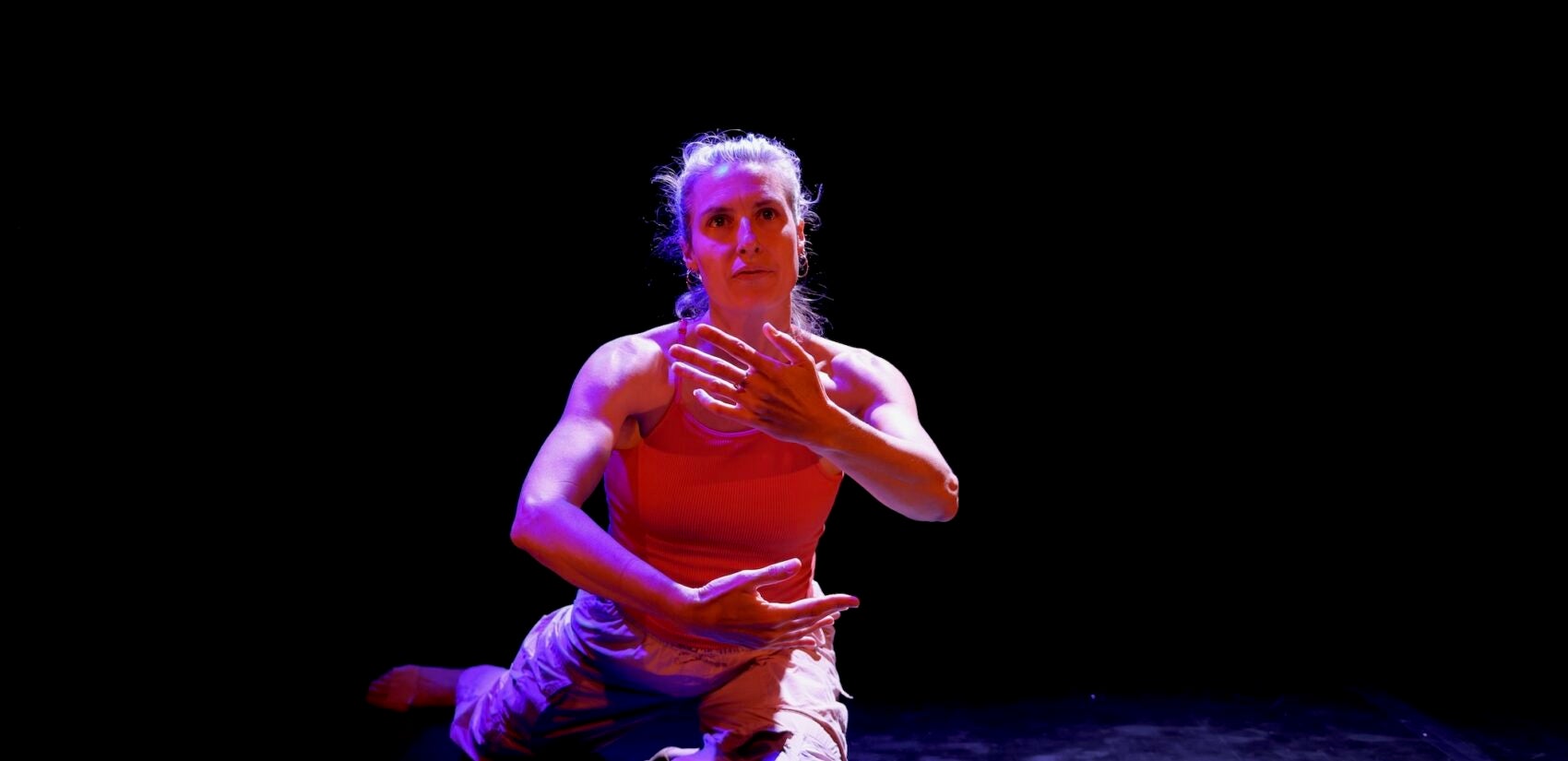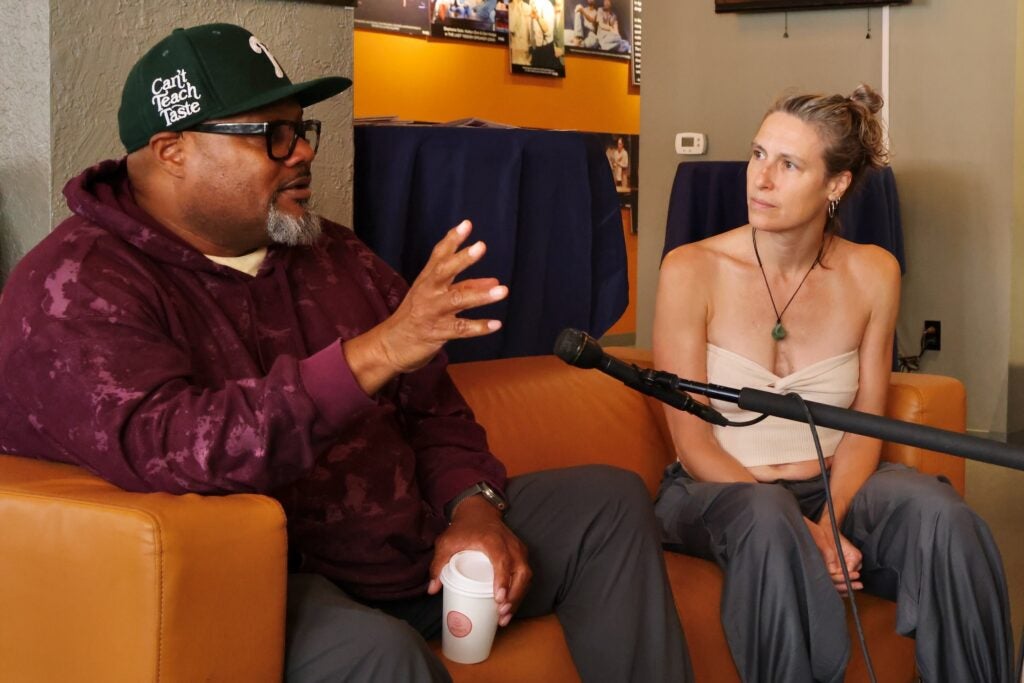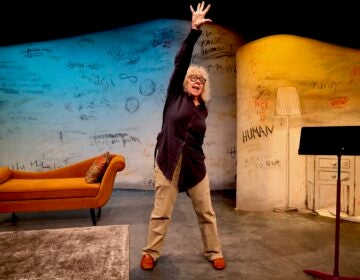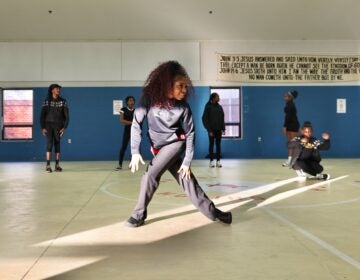Still dancing after all these years: Philly Fringe revives a solo work from 2000
Rennie Harris and Megan Bridge expand a student project from 25 years ago into an evening of self-reflection and social commentary.
From Philly and the Pa. suburbs to South Jersey and Delaware, what would you like WHYY News to cover? Let us know!
As part of the 29th Philadelphia Fringe Festival’s opening weekend, a featured dance performance revisits a brief moment of the festival 25 years earlier.
Rennie Harris and Megan Bridge have revived and expanded a seven-minute solo dance from 2000, “Beautiful Human Lies,” into a 50-minute multimedia piece of performance theater, “Beautiful Human Lies: Chapter 4,” at the Drake Theater in Center City.
“It was nice to see Megan again and to see us in our older bodies,” said Harris, 61, wearing a dark green Phillies hat over his bald head. “I had hair, I think. I had a full set. I’m still upset about that.”
Back in 1999, Bridge, a 19-year-old dance student at SUNY Purchase in New York, was looking for choreography to use in her senior performance. She called Harris, a fellow Philly native and already a star of hip-hop dance, to devise something for her.
The resulting “Beautiful Human Lies” was staged at the 2000 Philly Fringe Festival after Bridge graduated.
“It circled around these really obvious themes of a white woman doing hip-hop,” she said. “I’m a modern and contemporary dancer. I had never done any kind of hip-hop or street dance at that point in my life. It was really about this clash.”

Harris has now retooled “Beautiful Human Lies” four times for different ensembles. This one, “Chapter 4,” is the longest solo performance he has ever choreographed in his half-century career.
The new, expanded dance has many elements the original did not. Bridge’s performance against a robust multi-media program of projected text, imagery, video, and sound by Julie Ballard.
Bridge also delivers monologues about learning to recognize her clinical anxiety and her sheltered, white, suburban upbringing.
“When I say WASP, I mean I had never even had a bagel until college,” she tells the audience.
As a younger dancer, Bridge never made vocal sounds on stage. Now she stammers, shouts and stops to catch her breath mid-dance so she can speak to the audience.
“It’s something I actually address in the piece,” she said. “I talk about making sound and using my voice and how that’s been kind of a process of discovery for me.”
Reviving “Beautiful Human Lies” has become a barometer of personal growth for Bridge and Harris — a marker for how they have evolved over a quarter century.
Back in the 1990s, Harris’s provocative work was known to antagonize audiences. He recalls massive walkouts during his performances, and even police being called.
“I love making people uncomfortable,” said Harris.
While still provocative, he says he has somewhat mellowed over time.
“One of the things that was on my mind originally was how to do this without scaring people,” he said. “Hip-hop is the carrot. Everyone’s interested, and now they’re stuck in their seats. You’re going to see some flipping and some of what you think is hip-hop, but I’m also going to throw something in there that’s going to make you feel uncomfortable.”
Since that original dance in 2000, Bridge has built her artistic practice as a choreographer, teacher, writer and founder of Fidget, a space in Kensington for experimental performance. She has also become a mother of two.
“I don’t know if I really understood misogyny and racism when I was 19 years old,” she said. “Our culture is talking about these things a lot more readily. As a 46-year-old woman, I’ve experienced these things in my life in ways that I had never seen when I was a teenager.”
The first thing Bridge and Harris did when they started working together again was perform the original seven-minute “Human Lies” and see how it fit 25 years later.
“To see what resonated in her body, and what didn’t,” Harris said. “What changed. Over time, it’s like, ‘Oh, this is what I thought.’”

For Bridge, putting her 46-year-old body through the paces of her former 19-year-old self was “really satisfying.”
“I am a far better dancer than I was 25 years ago,” she said. “There is an understanding in the dance world that we are at the peak of our career and our physicality when we’re in our 20s. In real time, I have learned that that’s not at all the case. Maybe certain things like joint health was different 25 years ago, but I’m far stronger. I’m more flexible. I have a lot more body awareness. I have a lot better stamina.”
For Harris, returning to “Beautiful Human Lies” allowed him to inject it with some of the self-awareness he has developed over the decades. His explorations of racism and injustice through dance have turned internal.
“We’re addressing these things from the external point of view, like: ‘I wish those people would get it together, or the Great Pumpkin in the pumpkin patch, why did we put this person here?’” he said, referring to President Donald Trump.
“There’s no sense of self-reflection,” he said. “I lose my temper quickly. I get jealous. I’m emotional. I take things personal. I’m insecure. If we work on those things, then those things would then radiate out to the people around, will attract those same people, then so on and so on. Thus creating better humans.”
“Beautiful Human Lies: Chapter 4” will be performed at the Drake Theatre, 302 S. Hicks Street, in Center City, September 6 – 8. Preceding the performance on Saturday, September 6, will be a discussion between Rennie Harris and dance writer Brenda Dixon Gottschild.

Saturdays just got more interesting.
WHYY is your source for fact-based, in-depth journalism and information. As a nonprofit organization, we rely on financial support from readers like you. Please give today.










